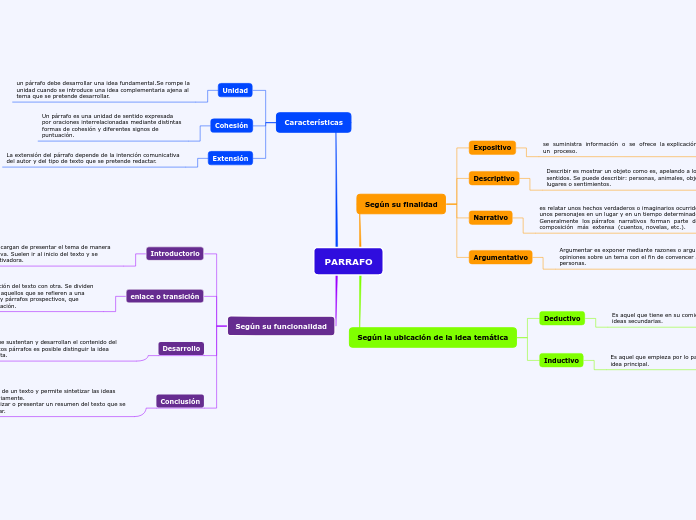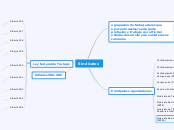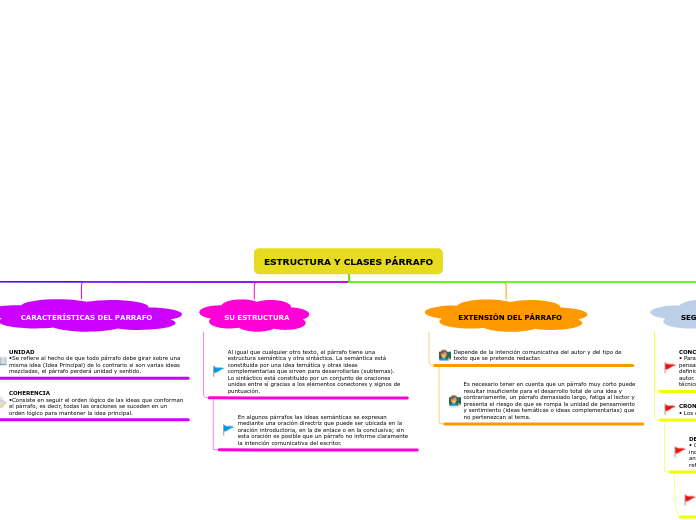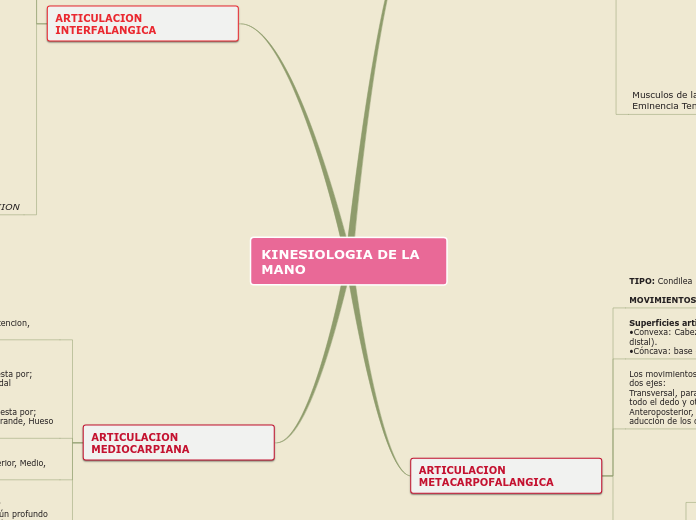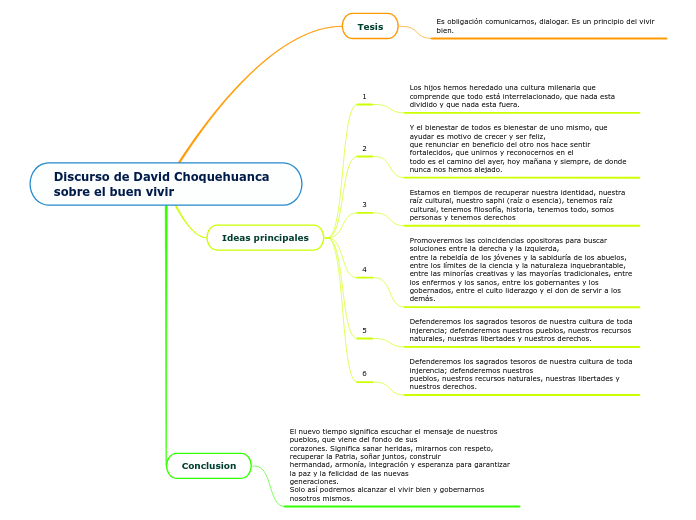PARRAFO
In linguistics, syntax is the set of rules, principles, and processes that govern the structure of sentences in a given language, usually including word order.
Según su funcionalidad
A compound sentence is a sentence that has at least two independent clauses joined by a comma, semicolon or conjunction. An independent clause is a clause that has a subject and verb and forms a complete thought.
Conclusión
Suelen ir al final de un texto y permite sintetizar las ideas expresadas previamente.
Sirven para finalizar o presentar un resumen del texto que se acaba de elaborar.
Ejemplo: Como puedes ver, para un crecimiento sano y una sólida salud, los seres humanos necesitamos una dieta variada y equilibrada.
Desarrollo
Son aquellos que sustentan y desarrollan el contenido del discurso. En estos párrafos es posible distinguir la idea temática explícita.
Ejemplo: Come todo lo que quieras de vegetales, excepto papas, garbanzos y lentejas. Frutas frescas, preferentemente maduras. Ensaladas crudas. Pescados no fritos. Yogurt natural sin azúcar.
Come con moderación: carnes rojas, carnes blancas como pollo. Queso, huevos y leche. Pan, pastas, arroz y papas. Pescados grasos en lata, fruta seca enlatada o cocida. Helado, cereales y jugo de frutas enlatadas.
enlace o transición
Create your own compound sentences, using the coordinators above.
Unen determinada información del texto con otra. Se dividen en párrafos retrospectivos, aquellos que se refieren a una información ya presentada y párrafos prospectivos, que anuncian una nueva información.
Ejemplo: Como verás la alimentación es esencial en el desarrollo del ser humano.
A continuación te daremos algunos consejos para ayudarte.
Introductorio
When independent clauses are joined with coordinators (also called coordinating conjunctions), commas and semicolons, they do more than just join the clauses. They add meaning and flow to your writing.
Estos párrafos se encargan de presentar el tema de manera interesante y atractiva. Suelen ir al inicio del texto y se presenta la idea motivadora.
Ejemplo: Los alimentos se ingieren diariamente, pues de no hacerlo estaríamos exponiendo a nuestro organismo a graves problemas de salud. Sin embargo, te has puesto a pensar si estás comiendo la suficiente cantidad y variedad de alimentos que necesitas.
Características
A complex sentence is a sentence that contains an independent clause and one or more dependent clauses.
An independent clause can stand alone as a sentence, but a dependent clause even though it has a subject and a verb cannot stand alone.
Extensión
An adverbial clause is a group of two or more words that function as an adverb in a sentence.
La extensión del párrafo depende de la intención comunicativa del autor y del tipo de texto que se pretende redactar.
Cohesión
An appositive clause follows another noun or noun phrase in apposition to it; that is, it provides information that further identifies or defines it.
Un párrafo es una unidad de sentido expresada por oraciones interrelacionadas mediante distintas formas de cohesión y diferentes signos de puntuación.
Unidad
The subject clause is a dependent clause that acts as a subject.
un párrafo debe desarrollar una idea fundamental.Se rompe la unidad cuando se introduce una idea complementaria ajena al tema que se pretende desarrollar.
Según la ubicación de la idea temática
Inductivo
See the example below and try to create your own simple sentences.
Tim is the driver.
Es aquel que empieza por lo particular para luego llegar a la idea principal.
Ejemplo: Eran las 10:00 am y estaba desesperada, sentía que no podía respirar, el tiempo pasaba más lento que nunca, y sabía que lo peor que me podía pasar es que me despidieran, pero a fin de cuentas esa oficina no era lo mío.
Deductivo
See the example below and try to create your own simple sentences.
Tim drives the car.
Es aquel que tiene en su comienzo la idea principal y luego las ideas secundarias.
Ejemplo: En la guerra es primordial hacer de las armas un negocio, y quien diga lo contrario no está siendo honesto. Todos los gobiernos invierten millones de dólares al año en esto, sabiendo que el dinero puede ser invertido en comida, salud y vivienda.
Según su finalidad
Argumentativo
The attribute is defined as a quality or characteristic of a person, place or thing.
Argumentar es exponer mediante razones o argumentos tus opiniones sobre un tema con el fin de convencer a otras personas.
Ejemplo: Convencer a alguien sobre lo positivo o negativo de un producto.
Narrativo
The predicative is defined as an adjective or noun forming or contained in the predicate.
Its main trait is that it serves to express a property that is assigned to a 'subject'.
For e.g.: The dog is old.
es relatar unos hechos verdaderos o imaginarios ocurridos a unos personajes en un lugar y en un tiempo determinado. Generalmente los párrafos narrativos forman parte de una composición más extensa (cuentos, novelas, etc.).
Ejemplo: Esa noche algo extraño pasaba en la ciudad, los niños se comportaban muy raro, y para su sorpresa la gata comenzó a hablarle pidiéndole que la ayudara a detener a las malignas, así que le dio un hermoso prendedor con el cual se transformó en una regordeta heroína.
Descriptivo
Traditional grammar defines the object in a sentence as the entity that is acted upon by the subject.
Describir es mostrar un objeto como es, apelando a los sentidos. Se puede describir: personas, animales, objetos, lugares o sentimientos.
The direct object is the receiver of the action mentioned in the sentence.
Ejemplo: María tiene los ojos claros, piel tostada por el sol, viste de amarillo y usa pulseras.
Expositivo
The predicate of a sentence is the part that modifies the subject in some way. Because the subject is the person, place, or thing that a sentence is about, the predicate must contain a verb explaining what the subject does and can also include a modifier.
se suministra información o se ofrece la explicación de un proceso.
Ejemplo: informar sobre el día del trabajo.
